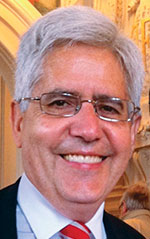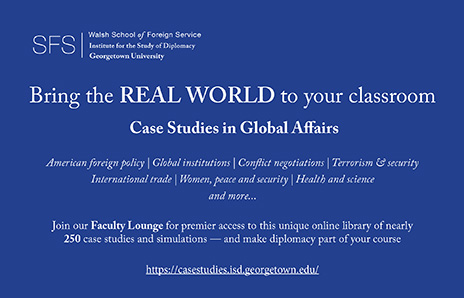Hope for a Renewed Partnership in the Americas
A Bolivian diplomat reflects on more than two decades of personal experience dealing with the United States.
BY JAIME APARICIO OTERO
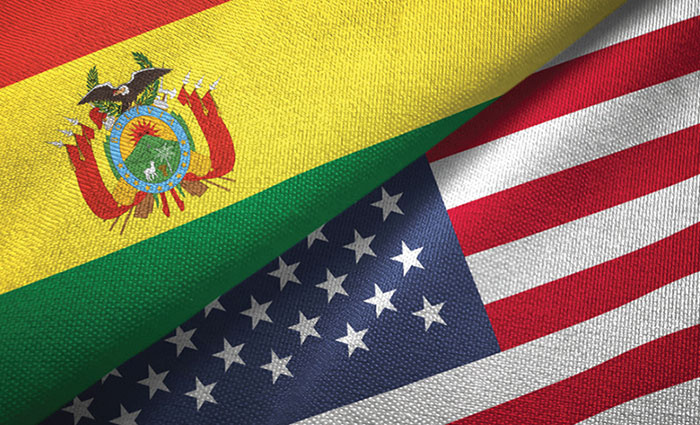
istockphoto.com/oleksii_liskonih
Both as a career Bolivian diplomat and as an official working with the Organization of American States, I have had intensive firsthand experience dealing with the United States for more than a quarter of a century. This includes my time as Bolivia’s vice foreign minister during the 1990s and as Bolivia’s ambassador to the United States from 2002 to 2006. It’s been a mixed bag, with much good and some less so.
While I am concerned by the drift toward authoritarianism visible throughout the hemisphere and the world today, I hope that in the future the United States will help correct that course by renewing its commitment to a foreign policy prioritizing the rule of law and democracy.
A Heady Time
My first impression of American diplomacy as a young Bolivian foreign service officer was, thankfully, positive; and that shaped my view that the United States can be a powerful force for good in the world. In 1980 Bolivian General Luis García Meza carried out a coup d’état with the support of the Argentinian military and European fascist mercenaries brought in by Klaus Barbie, a Nazi criminal refugee who had fled to Bolivia. Jimmy Carter was the president at the time, so U.S. foreign policy was focused on the pursuit of democratic principles and values over perceived short-term strategic interests.
U.S. support for the democratic forces in Bolivia played a crucial role in ending the dictatorship in my country and in facilitating the return of democratic regimes throughout Latin America in the 1980s and 1990s. I recall the unconditional support for the restoration of democracy in Bolivia of then-Ambassador Marvin Weissman and of career diplomats such as Alex Watson. Thanks, in part, to U.S. diplomacy, by the time of the first the Summit of the Americas in 1994, all states in the Americas from Alaska to Tierra del Fuego, with the exception of Cuba, were democracies. As Bolivia’s deputy minister of foreign affairs at the time, I was personally involved in the negotiations leading up to that summit. President Bill Clinton invited all democratic leaders of the Americas in a hemispheric initiative aimed at rebuilding the inter-American system in a new scenario defined by the end of the Cold War.
For the representative of a small country in a deeply asymmetric relationship with the United States, it is very difficult to find the space to promote your national interests in the American capital.
It was an exhilarating time, as 34 democratic heads of state and government discussed ways to commit ourselves to the collective defense of democracy and free-market economies. Our shared strategy in these negotiations was to build a new hemispheric architecture based on representative democracy, free markets and social development. The new regional agenda, unanimously approved by the presidents and prime ministers of the Americas, marked an exceptional moment for U.S. foreign policy.
The U.S. role is not all good, however. A more problematic U.S. policy relating to Bolivia, in my experience, has to do with the so-called war on drugs. This policy was deeply flawed and even counterproductive, in my view. Besides failing to do what it was designed to do, the policy lacked a social component in alternative development, and therefore produced unintended negative political and economic consequences, as well. The popularity of Bolivia’s intensely anti-American President Evo Morales was rooted in his opposition to the faulty U.S. counter-narcotics policies.
By conservative estimates, the policy has deprived Bolivia’s important informal economy of about half a billion dollars a year, or 5 percent of GDP, and has hit activity in sectors such as construction, financial services and small business particularly hard. Moreover, it did not succeed in achieving even its own narrow aims: today Bolivia grows more coca and exports more cocaine than ever. (By no coincidence, the former president was also president of the coca growers’ federation.)
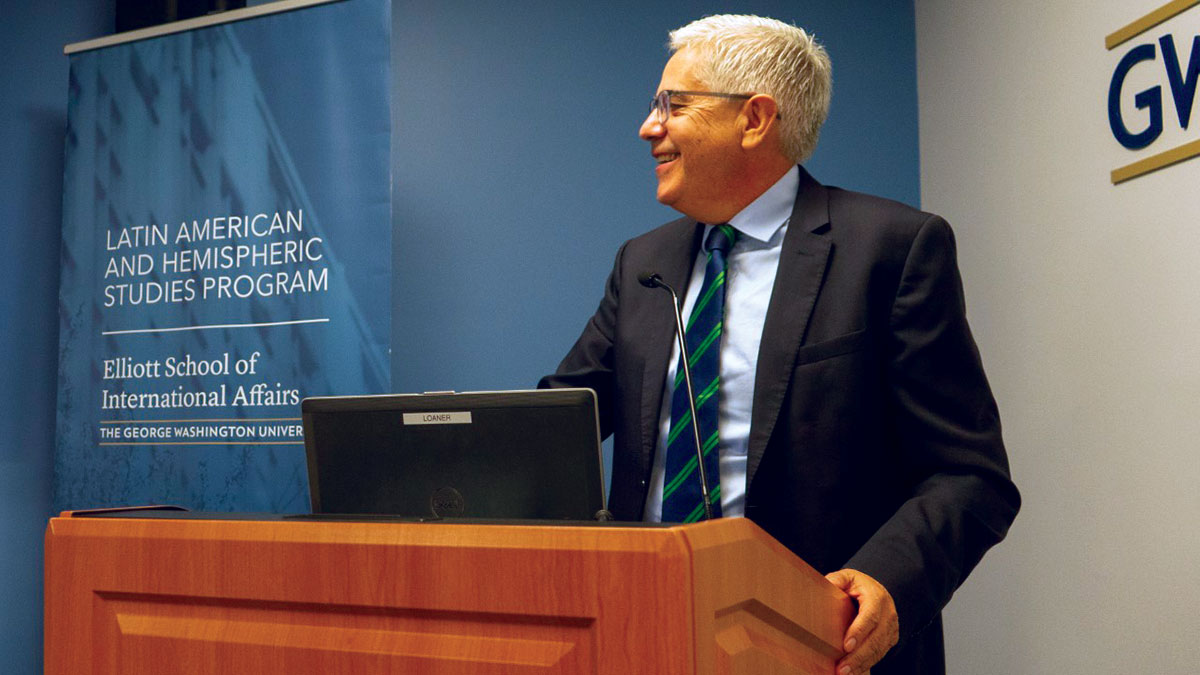
Jaime Aparicio Otero speaking at The George Washington University’s Elliott School of International Affairs in 2006.
Courtesy of Jaime Aparicio
Friend or Foe?
When I was Bolivia’s ambassador to the United States, a former American ambassador memorably told me, “In Washington there are more diplomats than taxi drivers.” For the representative of a small country in a deeply asymmetric relationship with the United States, this fact makes it very difficult to find the space to promote your national interests in the American capital—especially when U.S. attention and interest are taken up by other regions of the world.
When I started out, for example, the United States was in the midst of the war in Iraq, which absorbed all the energies of the government. The profound upheaval happening in my own country just couldn’t compete. I met that reality with a combination of realism and resignation. But today I sometimes reflect that the Iraq War was a tragedy not only for the Middle East; it also poisoned and fragmented relations with Latin America. The promising idea of mutual respect and shared principles launched in 1994 with the Summit of the Americas was lost during that time, replaced by a combination of narrow policy concerns and growing disinterest that has served neither Bolivia nor the United States.
I personally witnessed two incidents involving the former president of Bolivia, Gonzalo Sánchez de Lozada, that are telling in this regard. When President-elect Sánchez de Lozada and President George W. Bush met in the White House in 2002, the Bolivian requested an emergency economic cooperation package to support the deep economic reforms that had earned him worldwide recognition. (Sound macroeconomic policies had brought inflation under control, and innovative social policies were beginning to help spread the wealth.) But the U.S. president was not interested. “Sorry, I’m not Santa Claus,” Bush said.
“You’re lucky. You only know the Americans as foes; wait until you know them as friends,” Sánchez de Lozada quipped.
Sánchez de Lozada’s retort was prophetic: “Then, soon you will have me here as an exiled former president. … And in my place, you will have a government in Bolivia aligned with U.S. enemies.” Within a year, in October 2003, he was overthrown and later fled to exile in Washington, D.C. He was ultimately succeeded by the deeply anti-U.S. cocalero leader, Evo Morales, who remained in power until late last year when he tried to steal an election in pursuit of an unconstitutional fourth term.
Much earlier, in 1994, during Sánchez de Lozada’s first term as president of Bolivia (1993-1997), another telling incident occurred at the Ibero-American Summit in Colombia. When the president of Bolivia crossed paths with Fidel Castro in a corridor of the Hotel Santa Clara in Cartagena, Castro complained that the United States was using its cronies such as Argentine President Carlos Menem and Costa Rican President José Figueres to attack him.
“You’re lucky. You only know the Americans as foes; wait until you know them as friends,” Sánchez de Lozada quipped. That phrase, too, proved prophetic when, years later, following the rule of Oscar Wilde that “true friends stab you in the front,” the U.S. government refused to financially support a democratic government and ally of the United States, at a time when a conspiracy financed by Venezuela and advised by Cuba overthrew a government that was going through a deep social and economic crisis.
A New Partnership
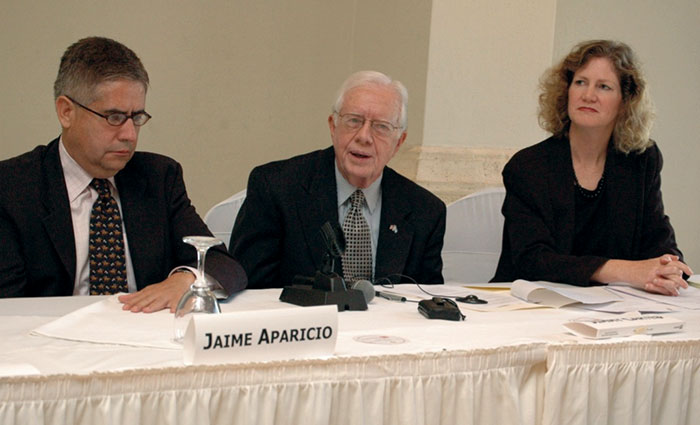
The first Summit of the Americas in Cartagena in 1994 brought 34 heads of state together to discuss the defense of democracy and free-market economies. From left: the author, then Bolivia’s deputy minister of foreign affairs; former U.S. President Jimmy Carter and Carter Center Senior Research Associate Jennifer McCoy.
Courtesy of Jaime Aparicio
In recent years, the mood of the region has changed, and diverging views have shattered the democratic consensus of the 1990s. Deep divisions have emerged. For its part, U.S. policy is no longer driven by an overarching uniting principle based on the broadly shared hopes and aspirations of people everywhere. In that sense, we seemed to have gone from euphoria to depression. In the first decades of the 21st century, the U.S. position, supported by many international NGOs, seemed to focus more attention on the great experiment of social inclusion taking place in such countries as Venezuela, Nicaragua and Bolivia than on confronting the evident drift toward authoritarianism of their governments. This approach was unsuccessful.
The current administration seems to have lost interest in the region altogether. As a result, Latin America, long neglected by Europe and taken for granted by the United States, has found a substitute in China. Eager for natural resources, risk-tolerant and nonjudgmental about matters of democracy and human rights, China has become the first- or second-largest export market for most Latin American countries.
In the light of the decisive failure of the authoritarian regimes in Venezuela, Nicaragua and Bolivia and the challenge represented by China’s value-free but highly problematic partnership, I hope that the lesson for future U.S. foreign policy is to renew its support for democracy, social development and rule of law in the hemisphere. To help overcome this period of despondency, U.S. diplomats will need to forge a renewed partnership of substance among the committed democracies of the Americas.

